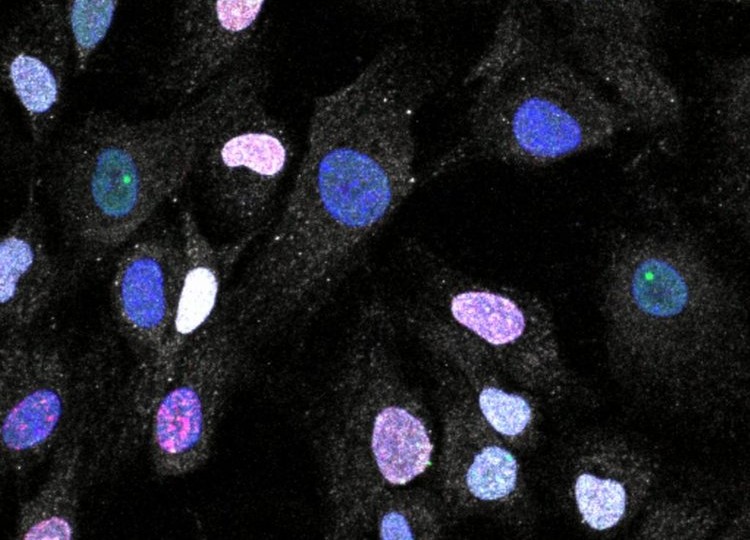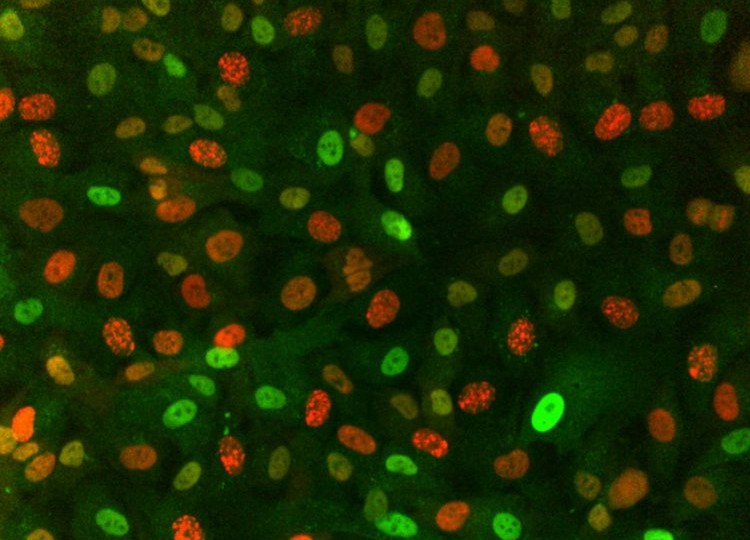“From a young age I found biology fascinating, how human bodies just work. That they go from two cells all through development and can go on to last 80 years or so. I found this incredible and wanted to know more.”
Dr Alexis Barr is the MRC LMS’s most recent Group Head, having set up the Cell Cycle Control research group. The group is concerned with trying to understand how cells in our bodies replicate when and where they are needed, for example in an immune response. They also investigate how the signalling pathways that control these processes are hijacked to drive the continuous replication of cancer cells.
“My first lab experience as a 2nd year undergraduate was at the MRC LMB. This experience revealed to me the possibility of a career in scientific research. I enjoyed the feeling you get when discovering things and testing out your thoughts and ideas. I also loved the atmosphere of working in a lab and using my hands. Before this work I hadn’t realised that this was a possible career route and it made me certain that it was what I wanted to pursue.”
Alexis is funded by MRC core funding and a six-year Cancer Research UK Career Development Fellowship. Her research follows both basic and applied science routes. The group want to understand how signalling pathways work in normal cells in order to understand how mutations in cancer alter those signalling pathways. This will help them to try and find ways to inhibit cancer growth.
“It is complicated to understand how each individual signal arriving at a cell controls its replication. It is even more complicated to understand what happens when a cell receives multiple signals at once and has to respond to all those signals. The key challenge we are currently addressing is trying to understand how multiple different signals are combined within a cell to initiate the cell cycle.”
Working to address these challenges, Alexis’s group utilise high content, real-time imaging of single cells, looking at cell cycle control from cell birth and through multiple generations. This approach has been incredibly useful and powerful for the group’s work, allowing them to see what’s happening inside cells and provide great insight into how cells work.
“Publishing my Cell Systems paper in 2016, “A dynamical framework for the all-or-none G1/S transition” was a career highlight. It was the first time I had initiated a project, brought together all the collaborators and seen it all the way through to the end. It was risky as I had to start from scratch and get on board new collaborators that I hadn’t worked with before. I really enjoyed how the collaboration opened up different ways of thinking and new ways of working. The collaboration was a great success and I’m still collaborating with Béla Novák’s group at the University of Oxford.”
Alexis is a great advocate for being an ambassador for your own science. She says “it’s important really to just go out and talk to people about your science. Be open to talk to people throughout the whole project, not just when you’re ready to publish. Get out and discuss your science, in conferences, local meetings, around your institute. When you’re writing a paper or setting up a project or stuck with a problem, you might remember someone you spoke to who could help, provide support or collaborate. It is hard, especially when people aren’t use to networking as part of their roles, but finding ways around this, such as dropping the person you want to talk to at a conference an email before the day can really help. Before submitting my fellowship application, I sent it to loads of people to look at and this started some great conversations.”
Pursuing a career in academia
Speaking about advice for those working in academic research, Alexis says: “If you do want to stay in academia and want to be a Group Head go for it!! At the end of my PhD I knew I wanted to go for Group Head. I had a couple of wobbles as a postdoc but I knew that at the end of day it was what I wanted to do. Stay focussed, stay committed and as long as you’re enjoying it keep doing it, you will overcome the challenges. Alternatively, if you’re not particularly enjoying working in a lab or thinking that actually academia is not the career path for you, don’t see this as a failure. It isn’t at all. It’s something that every researcher should really think about and put aside time to decide whether it really is a possibility long term.”
“I feel that MRC LMS is sensible about work life balance and understanding the demands on researchers. It is a demanding career and it can be hard to switch off and it is a career that can consume people. I can see things put in place for example by the AthenaSWAN families working group help. I recently had lunch with postdocs, an initiative set up by the AthenaSWAN careers working group and when speaking to postdocs I emphasise the need to be better at managing work life balance as it’s so essential in reducing stress. A lot of postdocs do get stressed especially worrying about whether they would cope with being a Group Head and it’s great to talk to them and share my experience.”
Alexis is passionate about diversifying science and talking to groups who may be less confident in pursuing careers in science. She has been a mentor with the Social Mobility Foundation for three years. As a mentor she provides support and advice to sixth formers who want to go to university and are predicted good grades but whose schools traditionally don’t send people to university or whose families have never had the opportunities to pursue higher education. The students have questions about what university is like, what to do if you want to apply, how to apply, how to get work experience and build CVs or write personal statements. Alexis says, “I really enjoy my work as a mentor and as the majority of it is over email I can do it in my own time and feel that I get a big gain for not having to give up too much. It’s been inspiring to see that the first girl I ever mentored, who I’ve stayed in touch with, is now in her 3rd year at university and really enjoying it. I find that people in her position are those that need our help the most and that we can make a difference and increase diversity in science by talking to these groups and helping them.”
“I’ve been at LMS for 2 months and have been really impressed by the standard of staff and students and how friendly everyone is. People have been extremely helpful and I’ve been enjoying how diverse the research is. It seems an exciting dynamic place to do work and we have great facilities that offer us the chance to do pretty much everything we could want to. I’m currently thinking about what achievements I would like to accomplish here and have loved getting involved in institute events. I have found the Friday junior Group Heads lunches great with everyone very open to chatting about their research and the work in progress seminars have been brilliant for me to gain a sense of what people are up to and the techniques they are using.”
Elife Sciences published an article about Alexis earlier this year, Life Story: Alexis Barr.
Alexis’s first lab experience was at MRC LMB in Andrew Leslie’s lab, LMB Emeritus, Structural studies of macromolecules, whilst she was a 2nd year undergraduate. Alexis confirmed her interest in cell biology and cancer when she completed a Masters at the Gurdon Institute, University of Cambridge. She worked with Jordan Raff looking at how chromosomes are separated in the final stages of the cell cycle.
Her PhD was at CRUK Cambridge institute looking at how mitotic spindles are built in order to separate chromosomes equally to two new daughter cells. She wanted to continue looking at the cell cycle for her postdoc but felt that the mitosis field was saturated and wanted a new challenge. She realised that the microscopy tools being used to investigate mitosis and the final stages of cell replication could be utilised to look at the early stages of the cell cycle, and how cells decide whether to replicate or not. Alexis was a postdoc in Chris Bakal’s lab at the Institute of Cancer Research where she was awarded a Pathway to Independence Fellowship which supported her in developing her own research ideas to go forward and form her own lab.



